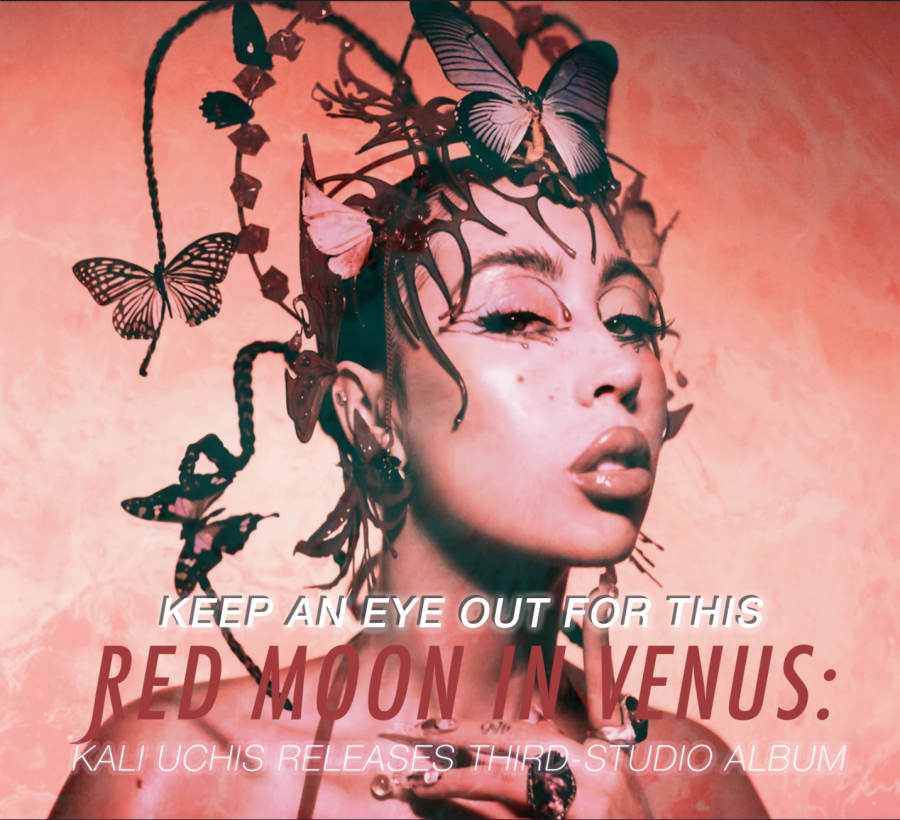Keep an Eye Out For This Red Moon in Venus: Kali Uchis Releases Third Studio Album
March 9, 2023
On March 3, R&B/pop and Colombian-American music artist Kali Uchis released her third studio album, “Red Moon in Venus,” a lush, psychedelic depiction of love and the divine feminine.
Throughout her career, Uchis has redefined the Latin pop music genre— mastering a blend of R&B and a bilingual, pop sound. Through her 2018 debut album, “Isolation,” Uchis explored far beyond the R&B and neo-soul genre, combining funk with bedroom pop and reggaetón. Following this release, Uchis’s second studio album “Sin Miedo (del Amor y Otros Demonios) ∞,” highlights her bilingual and binational identity, and depicts a bolder, freer development from her debut album. Once again morphing genres through dreamy, moody pop takes on boleros, reggaetón and Latin soul, Uchis proves her sound’s inability to be directly labeled and concludes the album by calling upon a divine being — free and unburdened with duty— singing “A nadie le debo,” (“I don’t owe anyone anything”).
Uchis’s “Red Moon in Venus” paints a picture of a highly feminine, dreamy sense of escapism while simultaneously maintaining control over her reality and femininity. The album tells a story of a relationship over time, progressing through phases of all-consuming, sensual, carefree love to the realities of toxic circumstances and protecting one’s peace. The introductory record, “In My Garden…” and “I Wish you Roses” both present a dreamy, lush setting through birds chirping and confessions of love, lighting the match of idealized love that burns throughout the first half of the project. On the track “Worth the Wait (feat. Omar Apollo),” Uchis emphasizes the idea of being selective about intimacy, protecting one’s body and being exclusive about who it is shared with. In “Love Between…” and “All Mine,” Uchis explores maintaining confidence in a romantic interest, sporadic thoughts and feelings while falling in love and seeing beyond the fear of vulnerability and emotional trust while committing to someone. She sings, “Don’t gotta fight for what is mine (Now) / You couldn’t keep him even if I gave him to you / It’s just pathetic at this point / If you think my baby’ll leave me for you (Tell the world).” The following track, “Fantasy,” featuring romantic partner and rapper Don Toliver, uses an afro-funk beat to highlight the importance of never settling for someone and striving for only the full fantasy that falling in love presents. Through the Spotify-enhanced album feature, Uchis describes the song as a testament to understanding that the expectation of being treated exceptionally well is not unrealistic. In concluding the song, Uchis interrupts the beat and says “That’s it, that’s the end of the song, come on baby, let’s go home,” symbolizing the end of the initial infatuation seen throughout the album, or the end of a honeymoon phase.
Throughout the second half of the album, Uchis taps into the realities of complications and overcoming hurdles when it comes to relationships, as well as exploring concepts of karma, self-worth and not allowing others to have an effect on a relationship’s integrity. In a psychedelic, Toro y Moi-esque acknowledgment of karma and its repercussions, “Moral Conscience” serves to clarify that doing wrong on good people will result in consequences (“I hope you know when karma comes ‘round / Knockin’ down on your door / She’s comin’ to collect ‘cause karma won’t forget”). On “Blue,” Uchis uses a down-tempoed, more melancholy sound to recognize the obstacles that relationships can present, and paints a picture of feeling distant from the person you are the most connected to. The saxophone in the background plays a call-and-response game with Uchis’ vocals throughout this track, evoking a sound of longing and reaching out for a loved one. In the chorus, Uchis sings, “Cause what’s the point of all the pretty things in the world if I don’t have you?” On the other hand, in a complete sound and tone shift, “Deserve Me (with Summer Walker)” addresses prioritizing self-worth, as Uchis sings, “I like it better when you’re gone / I feel a little less alone / You know I never needed you / Didn’t deserve me.” Walker’s R&B sound, combined with Uchis’s smooth harmonies and vocals make this track the ideal R&B serenade, preaching ideas of self-love and confidence.
To conclude the album, Uchis returns to the sounds of nature in “Happy Now,” using this track as a choice to let go of the drama that life poses and simply choose to be happy. Uchis sings, “Don’t gotta listen to a word they say / It was never their business anyway / Let’s you and me start over today / Be happy.” Transitioning from being blinded by an all-consuming love to recognizing when a relationship becomes toxic and choosing to protect oneself from drama, the latter half of the record is a reminder of the realities of romantic situations and serves to maintain control over these decisions.
Overall, “Red Moon in Venus” serves as a masterful testament to Uchis’s inability to be secluded into one genre of music, and paints a dreamy, hyper-feminine and beautiful picture of love and the divine. For “Kuchis” everywhere, this project offers another fantastic look into the creative mind of Uchis, and gives promising insight into this Grammy winner’s future.








